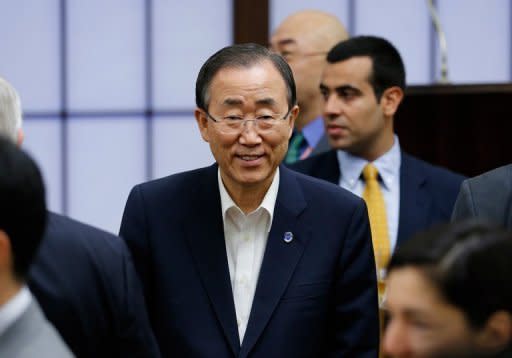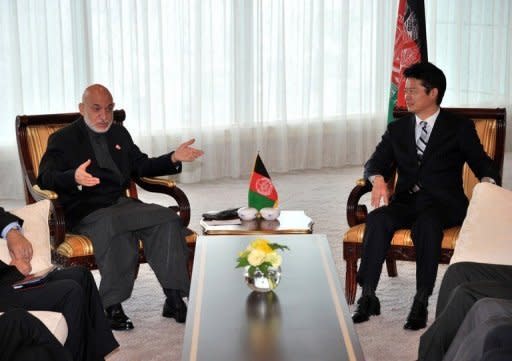Donors pledge $16 bn Afghan aid at Tokyo meet
Donor nations on Sunday pledged $16 billion for Afghanistan to prevent the country from sliding back into turmoil when foreign combat troops depart, but called on Kabul to implement reforms to fight graft. A statement at the closing of a conference in Tokyo confirmed donors would stump up $16 billion in civilian aid through 2015, with several pre-conditions including a clampdown on corruption. Afghan President Hamid Karzai was in the Japanese capital along with US Secretary of State Hillary Clinton and UN Secretary General Ban Ki-moon for talks focused on the so-called "transformation decade" after the NATO drawdown. "(The agreement) established a renewed, stronger foundation for partnership to support sustainable growth and development of Afghanistan throughout the transformation decade", the statement said. Sunday's conference hosted representatives from about 80 nations and international organisations in a gathering aimed at adopting the "Tokyo Declaration", pledging support and cash for the turmoil-wracked nation. The deal is meant to plug the gap between what Kabul gets from its barely-functioning economy and what it needs to develop into a stable country. Afghanistan covers only a third of the $6 billion it spends each year, not counting security costs, and has for a long time been heavily dependent on aid. There are fears that once the US and its allies no longer have to worry about their soldiers dying in Afghanistan after the 2014 pullout, the country could be left to drift into the hands of drug lords and extremists. The deal calls for a monitoring mechanism, and follow-up ministerial meetings every two years, to ensure Afghanistan was on the right track with respect to holding democratic elections, fighting corruption and promoting human rights. The statement added that participants "renewed their firm determination to combat terrorism and extremism in all their forms and never to allow Afghanistan to become a sanctuary for international terrorism again". Afghan Foreign Minister Zalmai Rassoul said Kabul would make good on its commitments. "The Afghan government will deliver," he told a news briefing. "We are talking about the future. We are not talking about the past. And there is no choice. That is the duty that the Afghan government will deliver." Japanese Foreign Minister Koichiro Gemba said the deal sent the "strategic message that Afghanistan can continue to develop sustainably and in a self-reliant way in a post 2014 period". According to the World Bank, spending on defence and development by foreign donors accounted for more than 95 percent of GDP in 2010-11. In May an Afghanistan security conference in Chicago involving the countries of the NATO-led coalition adopted a plan to provide $4.1 billion in annual security aid in coming years. Earlier Sunday, UN chief Ban said Afghanistan had made headway in security and development but progress remained fragile. "Failure to invest in governance, justice, human rights, employment and social development could negate investment and sacrifices that have been made over the last 10 years," he told the gathering. Hours later it was reported roadside bombs had killed 18 people in southern Kandahar province, underlining the still precarious security situation in Afghanistan. Clinton, who on Saturday said the United States had designated Afghanistan a major non-NATO ally, said peace on its own was not a sufficient dividend for the sacrifices that have been made. "We all know that Afghanistan's security will not be measured only by the absence of war. It will also be measured by the presence of jobs and economic opportunity," she told the meeting. Clinton said the administration of US President Barack Obama would be asking Congress to agree to keep American civilian assistance to Afghanistan at or near current levels until 2017. Karzai acknowledged security remained a major problem. "Afghanistan continues to face grave risks from common threats, not only terrorism and extremism. The peace and reconciliation process is of particular urgency at the present time," he told the meeting. "(The) responsibility to make Afghanistan peaceful and self-reliant is primarily our own as Afghans. We will remain steadfast in our commitment in this historic partnership."





